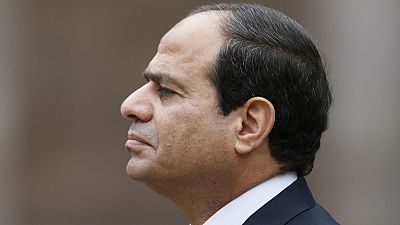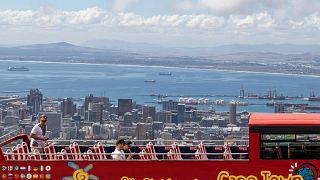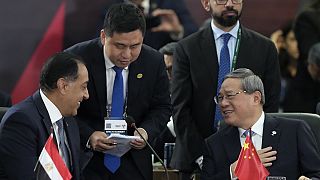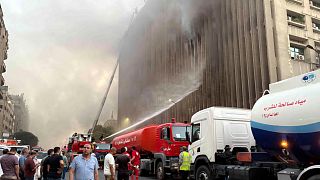Egypt
Egypt’s president Abdel Fattah al-Sisi is scheduled to address the United Nations General Assembly on Tuesday, even as his government grapples with protests at home.
Asked about the demonstrations that erupted in Cairo and other major cities over the weekend, Sisi blamed ‘political Islam’.
Hundreds took to the streets in the capital and other cities on Friday and Saturday, protesting government corruption. Authorities on Monday arrested more than 400 people in response to the rare anti-Sisi protests, according to human rights monitors.
Sisi was first elected in 2014 with 97% of the vote, and re-elected four years later with the same percentage, in a vote in which the only other candidate was an ardent Sisi supporter. His popularity has been dented by economic austerity measures.
In this article, we explore five key questions about these demonstrations that could potentially trigger a wider movement against former general-turned-President Sisi.
Why are Egyptians protesting?
The protests were called for by Mohamed Aly, 45, an exiled Egyptian businessman in Spain, who in recent weeks has levelled accusations of corruption at Sisi in a series of viral videos which have sparked unprecedented public debate.
Alleging how taxpayer money went into building lavish palaces for Sisi, they have struck a chord with Egyptians who have been bearing the brunt of stringent economic reforms his government has introduced since 2016.
“The image with which Sisi wanted to present himself as Egypt’s saviour from Muslim Brotherhood rule… has been completely dismantled”, said Hassan Nafaa, a veteran political scientist at Cairo University.
Sisi led the military ouster of Islamist president Mohamed Morsi in 2013.
Nafaa explained that Egyptians “have been shouldering the burdens of Sisi’s policies”.
He referred to the austerity measures imposed since the pound was floated in 2016 as a prime example fuelling discontent.
“Mohamed Aly came out of nowhere to become a hero in a certain sense. He managed to unmask Sisi,” Nafaa told AFP.
The Egyptian leader has flatly denied the graft allegations as “lies and slander”.
How did protests unfold?
Just after a highly awaited derby between two rival Cairo football clubs last week, scores of protesters gathered in the capital’s iconic Tahrir Square, the epicentre of the 2011 revolution.
Demonstrators in other major cities also joined in a spontaneous outpouring of chants against Sisi’s regime calling for the “downfall of the military regime” and shouting “Leave, Sisi”.
Who is protesting?
Egypt passed a restrictive anti-protest law in 2013 after Morsi’s overthrow and a renewable state of emergency remains in effect.
Sisi’s government has waged an ongoing wide-scale crackdown jailing thousands of Islamists, secular activists and even bloggers and comedians.
The latest example being Mahienour El-Massry, an award-winning human rights lawyer, arrested on Sunday.
The new wave of demonstrators “had not been political before engaging with Aly’s videos. They were shocked with the detailed information he gave,” said Nafaa.
Aly pinpointed villas Sisi had built in recent years in Mediterranean resort towns in Egypt that triggered the ire of many citizens.
“The protesters are those who are socially crushed. They say to themselves ‘we have nothing to lose’ by protesting,” Nafaa added.
How have authorities responded?
Sisi, currently in New York to attend the UN General Meeting this week, has blamed the protests on ‘political Islam’.
Pro-Sisi Egyptian media have gone to great lengths to show that the country is stable and public squares are under control, broadcasting nightly images of traffic moving smoothly.
The government’s foreign media accreditation body released a statement late Saturday cautioning international journalists that their reporting of events “should not be exaggerated”, without explicitly mentioning the protests.
Gamal Eid, director of the Arab Network for Human Rights Information, said more than 400 people in different parts of the country have been arrested in connection with the protests.
“Our lawyers can’t keep up,” he said.
Mohamed Lotfy, director of the Egyptian Commission for Rights and Freedoms, put the number at more than 450 and the Egyptian Center for Economic and Social Rights said 516 had been detained.
What will come next?
Aly, the building contractor, has called for a “million-man march” this Friday dubbing it a “people’s revolution” vowing to unseat Sisi.
Analysts assessing the fluid political situation believe that anger is swelling which would translate to more protests in the coming days.
“What happened on Friday is a worrying sign for the authorities. People went out to demonstrate even in the midst of a heavily securitised environment,” said political analyst Mustapha al-Sayyid.
“I believe these protests won’t stop at this point, but it’s also difficult predicting what comes next”, he added.
U.S. President Donald Trump on Monday gave strong backing to Sisi, saying the two countries have a ‘great long-term relationship’.
“Everybody has demonstrations,” Trump said with Sisi as they met on the sidelines of the U.N. General Assembly in New York.
“No, I’m not concerned with it. Egypt has a great leader.”
ALSO READ: Inside Egypt’s pro-Sisi constitutional changesAgencies














02:20
France: Avignon Festival celebrates Egyptian diva Umm Kulthum
01:42
Gaza conflict overshadows EU-Southern Neighbourhood talks in Brussels
01:54
"Great economic potential in Africa": five African leaders have lunch with Trump
01:05
Ethiopia's mega-dam on the Nile is "now complete", Prime Minister says
00:59
Several killed in road crash in Egypt’s governorate of Menofia
Go to video
Protesters gather in Ivory Coast, demand Thiam's return on electoral list